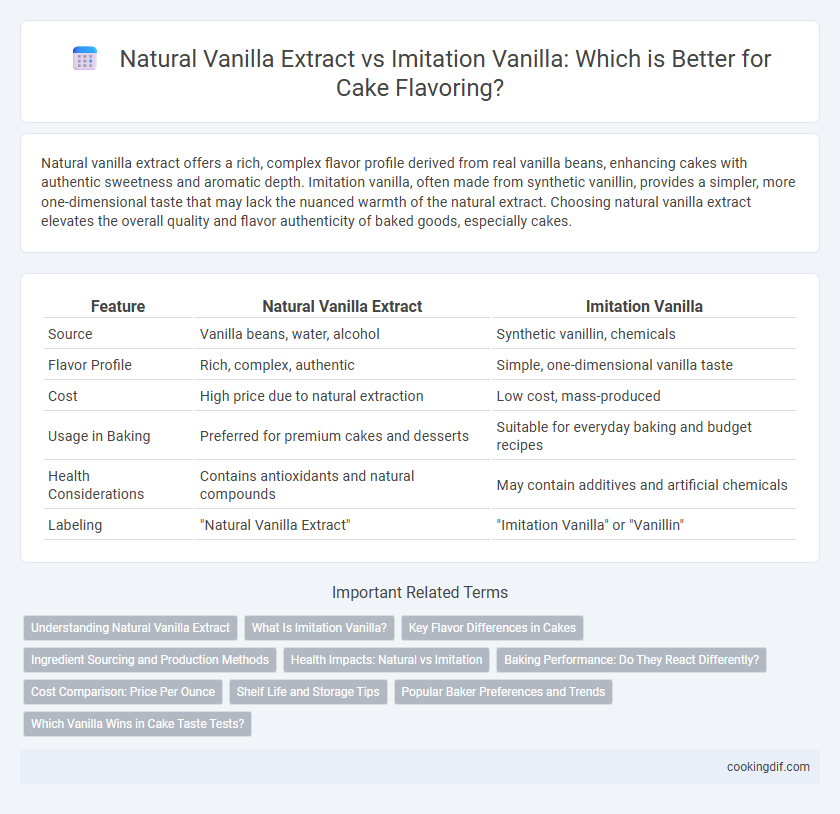Natural vanilla extract offers a rich, complex flavor profile derived from real vanilla beans, enhancing cakes with authentic sweetness and aromatic depth. Imitation vanilla, often made from synthetic vanillin, provides a simpler, more one-dimensional taste that may lack the nuanced warmth of the natural extract. Choosing natural vanilla extract elevates the overall quality and flavor authenticity of baked goods, especially cakes.
Table of Comparison
| Feature | Natural Vanilla Extract | Imitation Vanilla |
|---|---|---|
| Source | Vanilla beans, water, alcohol | Synthetic vanillin, chemicals |
| Flavor Profile | Rich, complex, authentic | Simple, one-dimensional vanilla taste |
| Cost | High price due to natural extraction | Low cost, mass-produced |
| Usage in Baking | Preferred for premium cakes and desserts | Suitable for everyday baking and budget recipes |
| Health Considerations | Contains antioxidants and natural compounds | May contain additives and artificial chemicals |
| Labeling | "Natural Vanilla Extract" | "Imitation Vanilla" or "Vanillin" |
Understanding Natural Vanilla Extract
Natural vanilla extract is derived from real vanilla bean pods, containing complex flavor compounds like vanillin and hundreds of aromatic elements that create a rich, authentic taste. It offers a depth of flavor and subtle nuances that imitation vanilla, made primarily from synthetic vanillin, cannot replicate. Choosing natural vanilla extract enhances the overall quality and flavor profile of cakes, making them more aromatic and flavorful.
What Is Imitation Vanilla?
Imitation vanilla is a synthetic flavoring made primarily from vanillin, which can be derived from wood pulp or coal tar, rather than from natural vanilla beans. Unlike natural vanilla extract, which contains a complex blend of hundreds of flavor compounds, imitation vanilla offers a simpler, single-compound flavor that mimics the taste of real vanilla at a lower cost. It is commonly used in commercial baking and processed foods where cost and consistency are prioritized over depth of flavor.
Key Flavor Differences in Cakes
Natural vanilla extract offers a complex, rich flavor profile with floral and creamy notes that enhance the depth and aroma of cakes, while imitation vanilla tends to provide a more straightforward, sweeter taste due to synthetic vanillin. Cakes flavored with natural vanilla produce a more authentic and nuanced vanilla essence that improves overall taste quality and pairs well with buttery or fruity cake recipes. Imitation vanilla, though cost-effective, often lacks the subtle, mellow undertones found in natural extract, resulting in a less sophisticated flavor experience.
Ingredient Sourcing and Production Methods
Natural vanilla extract is derived from cured vanilla beans through a labor-intensive process involving hand-pollination, harvesting, and solvent extraction, ensuring authentic flavor compounds like vanillin and other complex aromatic elements. Imitation vanilla, or synthetic vanillin, is produced chemically from lignin or guaiacol in industrial settings, offering a consistent but simpler flavor profile lacking the nuanced depth of natural extract. Ingredient sourcing for natural vanilla is limited and expensive due to the delicate cultivation, while imitation vanilla benefits from scalable and cost-effective production methods.
Health Impacts: Natural vs Imitation
Natural vanilla extract contains antioxidants and trace amounts of essential nutrients, contributing to minimal health benefits, whereas imitation vanilla is primarily composed of synthetic vanillin, which may contain additives and lacks nutritional value. Consuming natural vanilla extract in moderation is generally safe and free from harmful chemicals, while imitation vanilla can sometimes trigger allergic reactions or sensitivities due to artificial ingredients. Choosing natural vanilla extract supports cleaner ingredient profiles and reduces exposure to potentially harmful synthetic compounds often found in imitation products.
Baking Performance: Do They React Differently?
Natural vanilla extract contains complex compounds like vanillin, aldehydes, and phenols that interact with other baking ingredients, enhancing flavor depth and aroma in cakes through Maillard reactions. Imitation vanilla primarily consists of synthetic vanillin, which lacks these additional compounds, resulting in a simpler flavor profile and less impact on the chemical reactions during baking. The richer chemical composition of natural vanilla contributes to improved browning and flavor development, whereas imitation vanilla often yields a flatter taste and less complex baked goods.
Cost Comparison: Price Per Ounce
Natural vanilla extract typically costs between $3 to $10 per ounce, reflecting its genuine vanilla bean content and labor-intensive extraction process. Imitation vanilla, on the other hand, is significantly cheaper, often priced around $0.50 to $1 per ounce, due to synthetic vanillin production. This stark price difference makes imitation vanilla a cost-effective choice for large-scale baking, while natural extract remains preferred for premium flavor quality despite its higher expense.
Shelf Life and Storage Tips
Natural vanilla extract contains real vanilla beans and has a shelf life of up to 4 years when stored in a cool, dark place away from direct sunlight. Imitation vanilla, made from synthetic vanillin, tends to maintain its flavor longer but may lose potency after 2 years if not stored properly. To maximize shelf life, keep both types in airtight containers at consistent room temperature, avoiding humidity and heat sources.
Popular Baker Preferences and Trends
Popular bakers often prefer natural vanilla extract for its rich, authentic flavor and aromatic complexity that enhances cake recipes. Trends show a growing demand for natural ingredients, with many artisanal and high-end bakeries opting for pure vanilla extract to meet consumer expectations. Imitation vanilla remains a budget-friendly choice but is less favored due to its simpler, less nuanced taste profile.
Which Vanilla Wins in Cake Taste Tests?
Natural vanilla extract contains complex flavor compounds like vanillin and hundreds of others that create a rich, authentic aroma enhancing cake taste profiles. Imitation vanilla, made primarily from synthetic vanillin, offers a more one-dimensional sweetness but lacks the depth and warmth found in natural extracts. Taste tests consistently favor natural vanilla for its robust, nuanced flavor that elevates cake recipes to gourmet levels.
Natural vanilla extract vs Imitation vanilla for flavoring Infographic

 cookingdif.com
cookingdif.com